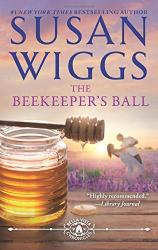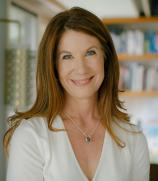Interview: June 26, 2014
Susan Wiggs is following up the success of THE APPLE ORCHARD, the first book in her Bella Vista Chronicles series, with THE BEEKEEPER’S BALL. This second installment picks up where the first left off, but this time the story is Isabel’s. As Tess prepares to get married, Isabel is forging forward in her own life, trying to forget her painful past…which becomes complicated when swaggering, war-torn journalist Cormac O’Neill arrives to dig up old history. In this interview with Bookreporter.com’s Amie Taylor, Wiggs talks about associating food with love and comfort; her own, let’s just say, tender relationship with bees; and why readers will root for the unlikely couple at the heart of the story. She also shares how she stays motivated to write every day, and the theme she finds herself constantly drawn to (like a bee to honey?): the resilience of the human spirit.
Bookreporter.com: In THE BEEKEEPER'S BALL, you tell the story of Isabel Johansen, a woman who has suffered great emotional pain during her life, but who now has the chance to grab the happiness she deserves when she opens her own cooking school at Bella Vista. What made you choose cooking as her panacea?
Susan Wiggs: Because I think about food all day, every day. It’s my second or third favorite thing. One of my grandmothers had a traditional farm kitchen. She raised and made everything from scratch, and I mean everything. She used to make noodles and dumplings from her hens’ eggs; she grew the food for her table in her garden and raised her own livestock. I’ve always associated love and comfort with home-cooked food. In the novel, Mac asks Isabel that question right after the scene that ends “Best shower ever.” Her reply at that point (it’s on page 328) crystallizes my feelings and I hope resonates deeply with readers.
BRC: Isabel is also interested in beekeeping and producing her own honey. That's not a subject readers usually encounter as part of a women’s fiction novel. Do bees have a special meaning to you? Have you ever been closely involved with a beekeeping operation?
SW: My close encounters with bees almost always involve me getting stung. I think I’m in love with the idea of beekeeping, not actually doing it. Lots of people in my community keep bees, and beekeepers are generous with their knowledge and passionate about their craft. The opening scene, in which Isabel is trying to capture a swarm, has some basis in reality.
BRC: Cormac O'Neill hasn't exactly had an easy life himself. Was it hard to bring these two characters, who basically tend to be loners, together, or were they really a match made in heaven?
SW: It took me a whole book to sort these two out. But like the best falling-in-love stories, the heart wants what it wants, and they find their way to each other. Someone --- maybe that grandmother I just mentioned --- once said “There’s a lid for every pot.” Readers are going to be rooting for these two from the moment he whips off his shorts and stabs himself with the EpiPen. Trust me on this.
BRC: Isabel's heritage is Italian and Danish, while Mac's is obviously Irish. Do you have a personal connection with any of these countries when it comes to your ancestry?
SW: Let’s see...I love Italian food, I eat cheese Danish for breakfast, and my favorite beverage is Irish coffee. In terms of ancestry, I don’t connect, but I did love my in-depth research into all of these rich and beautiful cultures. I hope readers will connect, too. They definitely will if they experiment with some of the recipes in the book.
BRC: Having Tess's wedding at Bella Vista in the midst of Isabel's renovations gives the two sisters a chance to become even closer as they get to know each other better. Was it difficult to write Tess's happy story while Isabel still feels that she'll never find true love?
SW: Oh, boy, you said a mouthful! It’s always bittersweet to see the sister you love so flush with happiness and joy, because it magnifies what’s lacking in your own life. Isabel does understand that Tess’s journey to her happy ending was not the smoothest path, either. In fact, I think there’s a moment when that particular thought gives her hope.
BRC: THE BEEKEEPER'S BALL, a fascinating continuation of THE APPLE ORCHARD, gives your readers a chance to get to know the characters on an even deeper level. Was it hard to hold back some information about the story and the characters for THE BEEKEEPER'S BALL as you wrote THE APPLE ORCHARD?
SW: Not at all! I had this huge, sprawling, romantic story in my head, and I knew it would extend beyond one novel. There were also a lot of unanswered questions about Isabel as I was writing THE APPLE ORCHARD. She’s a mysterious figure, and I went into the writing of THE BEEKEEPER’S BALL hoping to dig deeper into her character. She is my favorite sort of person to write about --- smart, complicated, damaged, hopeful and bighearted.
BRC: The reappearance of TV chef Calvin Sharpe in Isabel's life was an interesting twist to the story. How has Isabel grown personally from the time when she was involved with Sharpe to how she is today?
SW: I can’t answer this in detail because it would create a spoiler. When Isabel was in culinary school and Cal was her mentor, she was very naïve and gullible. His reappearance causes a sea change in her life in the sense that she has to revisit her former self. Their final scene together was a pleasure to write! I hope readers give it a big "Hell, yeah!"
BRC: While all family sagas tend to have a patriarch who holds the family together, Magnus Johansen is a particularly engaging character. How were you able to make him so multidimensional?
SW: Magnus is a composite of the wise elders in my life --- my grandfathers, my father and men of that generation. He is brave and scrappy and flawed and passionate, and I was able to give him the wisdom, regrets and satisfaction that come from a life well lived. Magnus’s mannerisms and physical appearance are based on my own dad, who is in his 80s now.
BRC: I love the way you've woven together the past and the present in this novel. What made you decide to focus on characters from Denmark in World War II when so many other stories about this time period zero in on characters from Germany, France and England?
SW: In the U.S. Holocaust Museum several years ago, I got chills as I looked at an exhibit of a small wooden fishing boat that was used to convey members of the “Helsingor (Elsinore) Sewing Club” from Denmark to Sweden, which was neutral. Of course, the “sewing club” people were Jews and resistance workers fleeing the Nazis. For me, it was a moment all writers crave --- that “aha” moment when you see an entire drama unfurling in your head. So there was no question that I would focus on that aspect of WWII.
BRC: You've managed to convey the difficult pasts of so many characters in the book without the story taking a depressing turn. How do you manage to address such serious issues, yet fill readers with a sense of hope for the ultimate happiness of the characters?
SW: Stephen King wrote a fantastic memoir some years back, entitled ON WRITING. In it, he explains very well that every writer has only a few core themes that he returns to, again and again, as if they’re hardwired into the brain. I imagine this is one of my core themes --- that everyone faces difficulties in life. That’s a given. How one confronts those difficulties makes the difference between hope and despair. I deeply believe in the resilience of the human spirit, and this theme is dramatized again and again in all my books. And wow, thank you for that question.
BRC: What kind of books do you like to read when you get to take a break from writing the stories we all love so much?
SW: Oh, where do I begin? Books have been my constant companions all my life. There are books that have been life-changing for me, from THE CARROT SEED to Anne Frank’s THE DIARY OF A YOUNG GIRL to THE FLAME AND THE FLOWER. I love page-turning thrillers, juicy beach reads, well-told nonfiction...I just wish there were more hours in the day! I’m always reading a book, but the two hours before bed are usually the only time I get to sit and read. Currently I’m loving THE ONE AND ONLY by Emily Giffin.
BRC: Writing is such a solitary pursuit. What inspires you and keeps you returning to the keyboard to create one story after another?
SW: I go to my book each day the way I used to go to my day job (teaching). I feel a sense of calling and duty, just as I did when I walked into my classroom every morning. But writing is quieter than teaching. A lot quieter. I’m inspired by the many places I've traveled, by my friends and family, people I’ve met and readers I haven’t. They are all so important to me in ways they probably can’t imagine.
BRC: What was the best comment or feedback you've ever received about one of your books, whether from a fan or a reviewer?
SW: Gosh, this is another question that is hard to answer, because I’ve had such thoughtful feedback from readers and reviewers. There was a fan who said LAKESIDE COTTAGE saved her daughter’s life, because it made her realize the girl was diabetic. And another who used a passage from THE APPLE ORCHARD in her wedding. There's a special reader in Massachusetts who sends me a picture of her and her guide dog every time she reads one of my books in braille or listens to an audiobook. And many readers who write to tell me my books have helped them through illness and hard times. Those are the comments a writer lives for. My favorite review was in a local paper, years ago, and it became the name of my LLC: “If you like to laugh, cry and dream, read Susan Wiggs.” So my LLC is Laugh Cry Dream Read.
BRC: Obviously you must be drawn, to some degree, to the locations you write about in your books. What is your favorite travel destination when you have a chance to get away from it all?
SW: Bali, Indonesia. It is magical, beautiful, remote and spiritual. And worth every minute of the 20 hours of flying it takes to get there. When we first meet Mac in THE BEEKEEPER'S BALL, he's wearing a t-shirt from the place I surfed in Bali.
BRC: What can we look forward to seeing from you in the future?
SW: I’m excited because two of my oldest and most beloved historical romances are being republished this summer --- THE MISTRESSES OF NORMANDY and THE MAIDEN OF IRELAND. They’ve been out of print for years. Later this year, I have a story about Christmas and food --- the paperback edition of CANDLELIGHT CHRISTMAS. Next year’s new hardcover will be a fresh entry in the Lakeshore Chronicles series. Which, by the way, will never get finished if I don’t get back to work! Thank you so much for the chat. Love your thoughtful questions, love Bookreporter, love book clubs!
Speaking of book clubs, we love to furnish them with "book club care packages." Interested clubs should contact me at susanmwiggs@gmail.com, or check in on Facebook.




